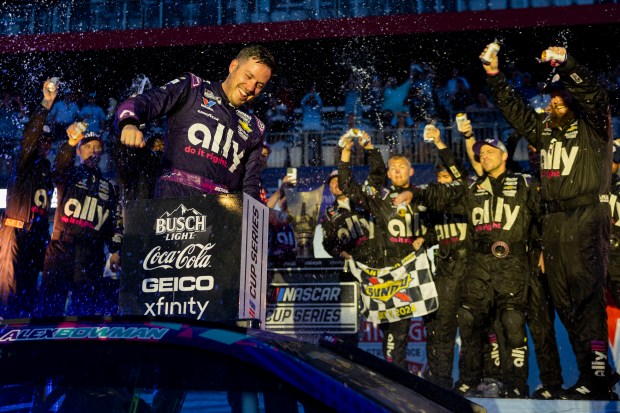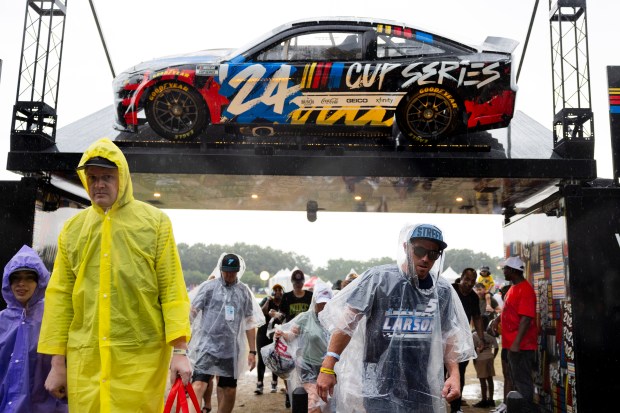The second NASCAR Chicago Street Race, held July Fourth weekend, generated $128 million in total economic impact, a 17% increase over the inaugural event, according to a study commissioned by Choose Chicago, the city’s tourism arm.
In an even more dramatic gain, the nationally televised Cup Series race also generated $43.6 million in media value for Chicago, up 85% over last year, according to a companion report.
From hotel bookings to the number of out-of-town visitors, most economic measures showed an upward trajectory in Year 2 of the street race, fueling optimism for next summer’s event, which has already been renewed by the city.
Rainfall, TV ratings and total two-day attendance were the three most notable declines, however.
“These reports show positive year-over-year growth across key impact metrics that we expect will be the beginning of a trend we will continue to observe next year,” Rich Gamble, interim president and CEO of Choose Chicago, said in a news release. “They also show that, in addition to significant direct economic impact, NASCAR is bringing incredibly valuable national and international media exposure to our city through the televised broadcasts of race days.”
The study, released Sunday, was conducted by Temple University’s Sport Industry Research Center, which issued a similar report following the inaugural event last year.
Launched as a fan-base-expanding departure from the traditional NASCAR oval track, the Chicago Street Race features a 12-turn, 2.2-mile pop-up course through Grant Park, down DuSable Lake Shore Drive and up Michigan Avenue, which are closed off and lined with temporary fences, grandstands and hospitality suites.
The 2024 street race weekend drew 53,063 unique visitors, up 12% over last year, with more than half of attendees traveling to Chicago for the event. Total attendance, however, fell 5.5% to about 75,000 racegoers, the study found.
The introduction of single-day ticket sales by NASCAR likely contributed to attracting more unique visitors, despite a lower overall two-day attendance, according to Bradley Baker, an assistant professor in the department of sport, tourism and hospitality management at Temple University and a co-author of the study.
“Fewer total attendance, more unique attendees,” Baker said. “That’s driven in part by the strategic approach and the shift in how to position and how to sell for it.”
The 27,188 nonlocal attendees came from 24 countries — nine more than last year — and 46 states. However, many of “out-of-towners” may have simply traveled from the suburbs, since the study considered anyone outside of Cook County as nonlocal, Baker said.
The out-of-town attendees spent about $568 per day in Chicago and booked 33,268 hotel room nights, according to the study. Overall, the event accounted for more than 38,000 hotel room nights, including NASCAR employees and vendors, up 29% from last year.
The race weekend supported 865 jobs and generated $9.6 million in local and state taxes, both numbers topping last year, the study found.
The event generated $75.5 million in direct impact for Chicago, which expanded to include indirect and induced effects brought the total economic impact to $128 million. Last year, the street race generated $108.9 million in total economic impact.
In 2023, the inaugural Fourth of July weekend event navigated record rainfall that curtailed races, canceled concerts and left remaining fans soaked. This year, while sunny skies prevailed for the Xfinity Series race on Saturday, the Cup Series race was once again shortened when rain delays forced officials to call the race after 58 laps as darkness fell on the unlit street course.
“I think Chicago’s gotten a bit unlucky with that two years in a row now, but got less unlucky with it this year than they did last year,” Baker said.
Baker said assessing the economic impact of the rain is not a simple calculation. But the lengthy delays during the 2024 Cup Series race likely impacted the TV ratings.
The extended broadcast of the Grant Park 165 on NBC, broken up by nearly two hours of programming filler as the street course shut down during a steady summer rain, averaged 3.87 million viewers, according to Nielsen data.
Last year, the delayed, shortened but uninterrupted inaugural TV broadcast averaged nearly 4.8 million viewers, the most watched Cup Series race on NBC since 2017.
Despite lower TV ratings, the Temple study found a huge year-over-year gain in the overall media impact, which jumped from $23.6 million to $43.6 million, due in large part to an increase in international coverage — from news stories to blogs — of the event.
“There were just more international outlets that were interested and were giving the race a bit more coverage than they had the first year,” Baker said.

The media value of the street race for Chicago is equivalent to six Super Bowl ads, according to the study.
While the city could never afford those ads, Tim Calkins, a marketing professor at Northwestern University’s Kellogg School of Management who heads up an annual Super Bowl advertising review, said the NASCAR media impact may be even more valuable.
“Chicago could never buy this sort of media activity,” Calkins said. “In some ways, the NASCAR coverage is better than advertising because it is authentic. The event features Chicago at its best.”
Under the terms of a three-year deal struck during former Mayor Lori Lightfoot’s administration, NASCAR agreed to pay the Chicago Park District a $500,000 permit fee in 2023, $550,000 this year and $605,000 in 2025, with an option to renew for two years. In addition, NASCAR agreed to pay a $2 fee per admission ticket, and an escalating commission for food, beverage and merchandise sold at the event.
In October 2023, Mayor Brandon Johnson committed to the second Chicago Street Race weekend, with NASCAR agreeing to pony up an additional $2 million for city expenses, but only after publication of the first economic impact study. This time around, Johnson gave the green light to a third year in August — before seeing the 2024 numbers.
On Sunday, he took a victory lap in the wake of the latest report.
“This is a race without parallel in the world and I am pleased that the event has generated positive economic impact and supported hundreds of jobs over the last two years,” Johnson said in the news release. “I look forward to working collaboratively with my leadership team and the community to leverage this event to drive even greater impact next year.”




